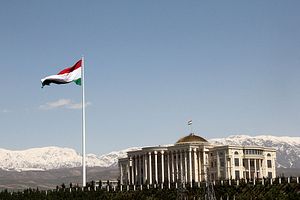On October 31, Tajikistan’s Ministry of Foreign Affairs renewed the accreditation of seven journalists working for RFE/RL’s Tajik service, known locally as Radio Ozodi. The approvals came a day before the crossing of a November 1 deadline and after months of silence. Two other journalists with the service who were facing the November 1 deadline — reported by Eurasianet to be Mirzonabi Kholikzod and Niso Rasulova, both serving as bureau heads — have not had their credentials renewed.
According to Eurasianet, there are still eleven people associated with the Tajik service without accreditation.
As Colleen Wood explained last week, this was not the first time Tajik authorities have weaponized accreditation as a tool to push back on unfavorable coverage:
But this episode seems different, according to Radio Ozodi’s Acting Director Salimjon Aioubov. In 2016, the Ministry of Foreign Affairs restored accreditation just a few weeks after revoking it. This time around, the waiting has felt endless. Aioubov told The Diplomat that it usually takes one month for the authorities to approve or deny applications for accreditation renewal, but months have passed without any hint from the Ministry about how it will proceed.
By refusing to issue a decision on these journalists’ accreditation renewals, Tajikistan’s Ministry of Foreign Affairs is tightening the screws on an already repressive media environment.
As Wood noted, the matter of accreditation was a true “transnational affair.” The journalists awaiting approval are based in Tajikistan; their boss, Acting Director Salimjon Aioubov, is based in Prague with the central RFE/RL team; RFE/RL is a U.S.-government funded organization.
On October 9, U.S. Congressmen Adam Schiff and Steve Chabot — the Democratic and Republican, respectively, co-chairs of the Congressional Press Freedom Caucus — penned a letter to Tajik President Emomali Rahmon, expressing concerns over the delay and other issues.
Last week, four U.S. Senators — James Risch, Robert Menendez, Marco Rubio, and Robert Casey — sent their own letter expressing concern over reports that “journalists affiliated with radio Ozodi… are being harassed, threatened, and in some cases, denied accreditation…”
Both letters cited the 2016 incident and characterized the withholding of credentials as potentially an effort to “restrict and attempt to influence Radio Ozodi’s independent journalism.”
On October 30, the Washington Post Editorial Board took up the issue, releasing a letter of its own, lambasting Rahmon for cracking down on the press in Tajikistan.
“Clearly, Mr. Rahmon has studied the dictator’s modern handbook: better not to actually close down the news media, which might trigger an outcry, but rather just squeeze the workers,” the Editorial Board wrote.
In both congressional letters, the future of the U.S.-Tajikistan relationship was underlined as at risk.
The first congressional letter commented that if “ongoing harassment of Radio Ozodi and its staff” continues, it could cause “damage the U.S.-Tajik relationship and [do damage] to Tajikistan’s reputation.” The group of senators, writing on October 25, expressed concern that if harassment continued there would be “repercussions for the strengthening of the U.S.-Tajik relationship.”
The Post Editorial Board’s piece was much more explicit, pointing to U.S. security aid to Tajikistan, which amounted to $33 million in fiscal year 2019.
RFE/RL’s Tajik service has been under scrutiny in the past year, following an investigation by Eurasianet accused the service of softening its coverage of the Rahmon family. The service’s director resigned, but its troubles have clearly not ended.
Meanwhile, there’s the matter of the rest of the Tajik mediascape, not to mention its barren political scene. U.S. congresspeople came out in support of a U.S. government funded media organization, but where were their letters when Asia-Plus, an independent Tajik news agency, was knocked offline in September? Or as the government blocked other Tajik news sites over the past several years?
Arguably, U.S. legislators care most about U.S. entities and are wary of diving too deeply into the messy politics of other countries. Tajikistan has long earned a pass from parts of the U.S. government due to its proximity and perceived importance to the war effort in Afghanistan — taking in millions in equipment, aid, and training, all the while shrinking the country’s political space and cracking down on dissent and media.

































